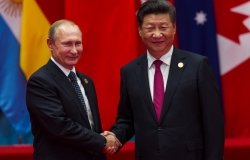Re-envisioning the Chinese Revolution Politics and Poetics of Collective Memories in Reform China
Gail Hershatter, University of California, Santa Cruz; Erik Mueggler, University of Michigan, Ann Arbor; Ching Kwan Lee, Woodrow Wilson Center, and University of Michigan, Ann Arbor; Anne Thurston, Johns Hopkins University; Paul Pickowicz, University of California, San Diego; Xin Liu, University of California, Berkeley; David Davies, Hamline University; Judith Shapiro, American University; Guobin Yang, Woodrow Wilson Center, and University of Hawaii, Manoa; Ban Wang, Rutgers University; Robert Chi, State University of New York, Stony Brook; Jingyuan Zhang, Georgetown University
Overview
What historical interpretations become collective memories? What are some of the political, personal and cultural uses of memories? What do people remember most about China’s revolutionary past and does it oppose official ideology? What is “revolutionary” about Chinese socialism? Twelve speakers examined these and related issues at an April 28 conference hosted by the Woodrow Wilson Center’s Asia Program. The conference commissioned nine papers and was divided into three panels. Anne Thurston, Judith Shapiro and Jingyuan Zhang served as chairs and offered cogent comments for each panel respectively.
Gail Hershatter argued that a fully understanding of 1950s rural China must include not only a full accounting of state activities and campaigns, but also an investigation of women’s narratives of the collective past. Erik Mueggler examined ghost stories in a minority community related to the 1958-1962 famines, memories that reject the state’s calls to forget the tragedy. Ching Kwan Lee pointed out that collective memories of state socialism among Chinese workers has turned into a powerful moral and social critique of present market socialism. Paul Pickowicz maintained that the history of the People’s Republic, when understood from a peasant perspective instead of an urban intellectual perspective, looks like an uninterrupted war waged by contemptuous urban bureaucrats on hardworking rural people. Xin Liu offered an anthropological critique of a case study conducted by Sociologist Fang Huirong, and demonstrated how Communist propaganda transformed memories. David Davies analyzed The Great Chinese Zhiqing [educated youth] Photo Retrospective in Shanghai and argued that the unnarrated photos permitted groups to differ in their interpretations, based on their contemporary lives. Guobin Yang attributed the proliferation of memories of the Cultural Revolution, apart from the official line, to economic, cultural, social, and technological change in China, as well as to the participation of the global community in such memories. Ban Wang observed that Jia Zhangke’s film Platform apparently goes along with pop and kitsch, the grotesque signs of uneven development, and the absence of future visions, but it still contains an epic yearning for individual self-fulfillment. Robert Chi demonstrated how the national anthem of the PRC, “The March of the Volunteers,” developed from a movie theme song, was re-worked and re-contextualized between the 1930s and the 1990s, as displayed in the four films discussed by him.
For many ordinary Chinese, more than two decades of socio-economic transformation has brought about social and moral dislocation, inequality and political discontent. As people grope for moral and cognitive frameworks to understand, assess, sometimes resist the momentous changes in their lives, memories of the revolution thrive. This conference highlighted popular memories of China’s revolutionary past as a political and cultural force in the reform period.
Drafted by Gang Lin, Asia Program Associate
Robert M. Hathaway, Director, Asia Program
Ph: (202) 691-4020
Hosted By

Indo-Pacific Program
The Indo-Pacific Program promotes policy debate and intellectual discussions on US interests in the Asia-Pacific as well as political, economic, security, and social issues relating to the world’s most populous and economically dynamic region. Read more
Thank you for your interest in this event. Please send any feedback or questions to our Events staff.










